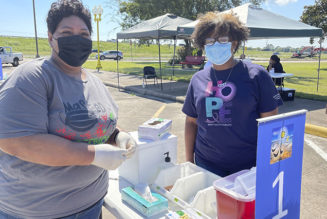
Proper nutrition, including a well-balanced diet, sufficient vitamins/minerals, adequate protein intake, and calcium, physical exercise/activity, and getting enough sleep improves one’s chance of fending off harmful bugs. Whether one is trying to beat the winter doldrums, prevent common winter respiratory illnesses (such as the flu, COVID-19, or RSV), is traveling, or is working a lot because of the upcoming holiday season, taking care of oneself is key.
-
There is no magic pill to boost your immunity. However, eating right, being active, and minimizing stress can improve your immune system and overall health.
-
Immunity-boosting strategies for winter aren’t newly discovered. Instead, they are tried and true recommendations that include a proper diet, proper hygiene practices, stress-reducing activities, and more.
-
In preparation for the winter, boost your immune system by getting your annual influenza (flu) vaccine.
-
Getting enough sleep, staying hydrated, minimizing alcohol consumption, not smoking, and getting natural sunlight exposure also help improve immune function.
Implementing these measures can boost your immune system and guard against illnesses while safeguarding your mental health.
Immunity boosting strategies for winter
Winter is when respiratory viruses such as the flu, RSV (respiratory syncytial virus), and others, including COVID-19 (here to stay), are commonplace. Taking steps to improve your overall health and well-being, including boosting your immune system, may help thwart that nasty respiratory infection we all dread.
We can do a lot to help our overall health regardless of the time of year. Eating a well-balanced diet, ensuring you obtain sufficient nutrients like vitamins B, C, E, and D, calcium, and zinc, getting adequate exercise, and avoiding a sedentary lifestyle all play a role in maintaining a healthy life. Further, as winter approaches, paying attention to proper hand washing and other hygiene measures is crucial. Wear a facemask if you are concerned about exposure, such as while traveling on planes and other public transportation or watching a movie or concert in a crowded theater.
Strategies to boost immunity
Contrary to popular belief, no miracle drugs or supplements boost immunity sufficiently to keep you healthy all year round. It would be fabulous if there was one thing we could all take to ward off illness in winter. For most products claiming to improve immunity, research studies do not support using most supplements or neutraceuticals (foods or food products with supposed medical/health benefits). However, there are a few things we can do to boost our immunity that research does support.
10 tips to support immune health
Colds accompany winter in the U.S., but there are several things we can do to strengthen our immune system against seasonal threats, though these hold regardless of the time of year.
Tip 1: Proper nutrition
As we all know, eating a healthy and complete diet helps lessen our chances of getting sick. Ideally, nutrition specialists and medical providers advise us to avoid highly processed foods and foods high in sugar and fats (especially saturated fats). Further, professionals recommend consuming enough healthy proteins.
While many supplements are touted as great for warding off evil spirits (or pesky viral diseases), only a few things are supported by science that may help boost your immune system. Ideally, one obtains all the necessary vitamins and minerals known to aid in immune health, e.g., vitamin C, zinc, and vitamin D, from their diet. However, some may need a well-researched multivitamin to help them get their daily vitamin and mineral requirements. Before choosing a multivitamin or vitamin supplement, check with your healthcare provider about recommended products and doses.
Vitamin C
Vitamin C has many benefits, including boosting our immune system. However, this water-soluble vitamin, which we cannot produce ourselves, must be consumed from our foods/drinks or, less ideally, via multivitamins/supplements. Research does demonstrate the role vitamin C plays in the immune system. Still, it doesn’t support ingesting in large quantities to prevent illness.
Further, while some research suggests that added vitamin C may help shorten the course of a cold or other infection, other studies say otherwise. However, current research indicates that drinking or eating orange juice daily protects your immune system and may lessen your risk of becoming sick. However, eating foods high in vitamin C seasonally or only once you are exposed to people who are sick will not prevent a cold or the flu. So, regular vitamin C consumption is beneficial, but starting supplementation only once ill is unlikely to make a difference.
Zinc
Some research suggests that taking zinc at the onset of respiratory symptoms such as a runny or congested nose, sneezing, runny eyes, or related symptoms may shorten the duration of a cold or related illness by a few days. However, a person’s overall zinc levels before disease, age, and other health factors may play a role in zinc’s benefit (if any) in shortening the duration of illness. Current research about using zinc as a preventative strategy for colds is not conclusive.
Talk to your healthcare professional before taking vitamin C, zinc, or other supplements that may potentially prevent or shorten the course of a cold or similar infection.
Tip 2: Stay hydrated
Our bodies need water to survive. Staying well hydrated helps our bodies to function properly. While we commonly think of water when referring to our hydration, consuming juices and other fluids can also improve hydration. However, watch alcohol consumption and caffeinated beverages, such as black tea or coffee, as caffeine dehydrates. Proper hydration helps support the body, ensures mental sharpness, helps keep us awake, and supports the immune system.
Tip 3: Vaccines boost immunity
Medical professionals advise all individuals to get their annual flu vaccine in October or November in the United States. The best time of year to get this immunization depends on where you live in the world and when the flu season starts. The vaccine is updated yearly, as the strain of flu circulating each year varies.
However, remember that not all respiratory illnesses have vaccines available, and no vaccine protects 100% of the time. However, people with underlying conditions are often at an increased risk of more serious disease, and thus, if vaccinations are available, getting immunized may help one combat illness more effectively.
Tip 4: Be active
While in an ideal world, we all have plenty of time to get 30 minutes or more of daily exercise, this isn’t a realistic expectation for many. Busy schedules, being taken in too many directions, addressing the needs of others such as kids and spouses, and not enough hours in the day, as well as underlying health conditions, pain, and lack of motivation, often interfere with getting enough exercise.
Striving for at least 3–5 days of physical activity improves overall health. Further, studies have shown that sedentary lifestyles can increase the risk of chronic diseases and shorten life. Thus, ensuring you aren’t sitting all day long, getting up and moving, and stretching every few hours can go a long way toward improving your health.
Tip 5: Maintain a healthy BMI
We all know the risks of obesity. Carrying excess body fat increases one’s chance of heart disease, arthritis, and diabetes, among other conditions. Further, obesity, according to the Centers for Disease Control and Prevention, can lower the effectiveness of vaccinations, including flu, and has a connection to decreased immune function.
Tip 6: The sun’s power
There is no replacement for sunlight. Vitamin D helps calcium regulation and other bodily processes, including aiding in the immune system. However, humans cannot make it themselves. We need the sun’s help or must ingest it in our diet. In today’s society, a large part of the population is vitamin D deficient. Even if it is only 5–10 minutes a day, try to get some rays if the sun is shining. Not only does sunlight improve vitamin D levels, but it boosts mood and gets one out in the fresh air.
Tip 7: Facemasks — Not just a fashion statement
COVID-19, though a devastating pandemic, taught us that facemasks and proper hygiene practices protect individuals from respiratory infections (including flu, RSV, and the common cold). Thus, properly worn facemasks can help protect you and others from illness. Consider their use in large gatherings, when traveling, when you are sick but must go out, or when you are around people who have been exposed to a contagious disease.
Tip 8: Stop smoking
Giving up smoking can go a long way toward improving your immune system and overall health. Smoking has long been known to be detrimental to one’s health, from an increased risk of cancer to heart disease to immune-mediated diseases such as rheumatoid arthritis due to nicotine’s ability to weaken the immune system. If you would like to stop smoking, follow up with your healthcare provider to discuss ways to ensure success.
Tip 9: Mental health matters
Taking care of your mental health in addition to your physical fitness lessens your chances of getting sick. A little self-care goes a long way. Shorter days, less sunlight, and cold or bad weather can make many depressed, lessen our motivation to be active and hamper our ability to stay well. Seek a healthcare professional’s advice if this time of year with shorter days, often colder weather, and the holiday season impair your ability to enjoy life or reduce your motivation to take care of yourself.
Stress hurts
Stress causes increased levels of the stress hormone cortisol. In the short term, this hormone has protective effects and permits the body to protect itself. But when stress goes on too long and remains unchecked, it can weaken the immune system. Taking care of oneself with mindfulness activities, reading a book, going for a walk, stretching, exercising, whatever your stress-reliever might be, helps to lessen the body’s stress response and supports a healthier immune system.
Sometimes, professional help is needed to improve mental health outlook and concerns. Other times, simply ensuring you spend time with friends and family, maintain a secure environment, and have a good social network is enough to keep you healthy. Mental stimulation and social interaction can promote health.
Tip 10: Get plenty of rest
Last but not least, get plenty of rest regardless of the time of year. Getting enough sleep goes a long way to supporting a healthy immune system. The harmful effects of too little or poor quality sleep abound. Lack of sleep increases stress, negatively impacting one’s immune system and overall health. Too little sleep increases one’s risk of numerous diseases.
Stay healthy this winter
Immunity is crucial to health. Heart disease, autoimmune illnesses, anxiety disorders, depression, stroke, and multiple types of cancer may weaken the immune system. Sadly, there isn’t a miracle immunity-boosting medication. Still, combining various measures helps boost immunity and reduce illness. Keep your diet nutritious and obtain the necessary vitamins and minerals. Ensure adequate hydration and sufficient sleep, interact with others regularly (supportive friends and family), get some sunshine, wash your hands, and avoid sick people during winter to reduce your risk of common seasonal threats and boost your immune system.









